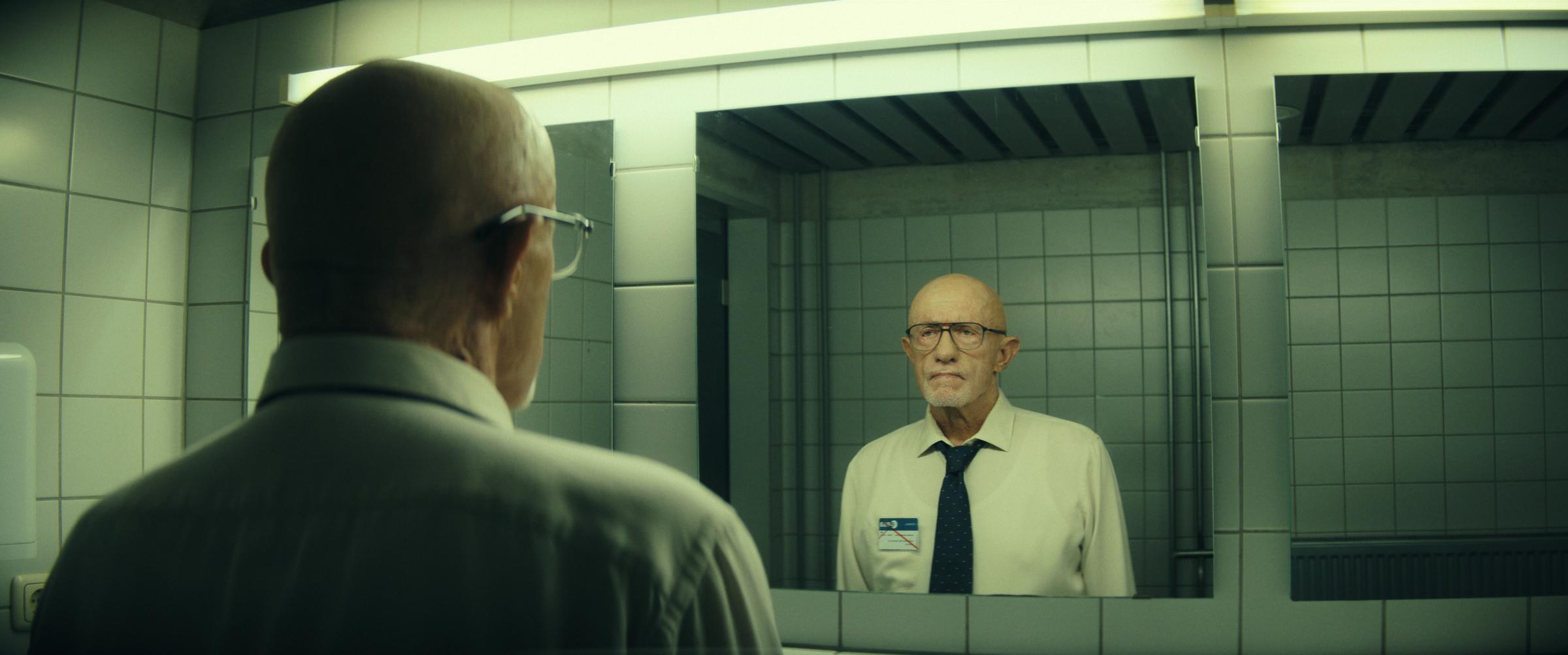Space travel is bound to change a person’s perspective. Astronauts see our world from a vantage point that has been shared by just a few people in its 4.5 billion-year history. The longer they spend drifting through the solar system, the more their experiences diverge from the human norm and thus the harder, one would imagine, it becomes to reconnect with earthbound loved ones. Life in space inevitably alters life on the ground.
So maybe that’s what is going on with Jo Ericsson, an astronaut played by The Girl With the Dragon Tattoo star Noomi Rapace, who appears, in the opening scenes of the gripping Apple TV+ thriller Constellation (which premieres Feb. 21), to be losing her mind. Holed up in a cabin in snowy northern Sweden with her 10-year-old daughter, Alice (Rosie and Davina Coleman), Jo dashes out into the frigid night, in pursuit of another voice screaming “Mama!” Little of what we see in these first few minutes makes sense. But the disconcerting sequence sets up a smartly paced sci-fi epic that is as perceptive about human psychology as it is about quantum physics.
That preface turns out to be a flash-forward to a climactic moment that creator Peter Harness (Doctor Who, The War of the Worlds) revisits often throughout the eight-episode series. The real story begins five weeks earlier. Jo is representing Europe on the International Space Station, while Alice and Alice’s dad, Magnus (James D’Arcy), follow her progress from the family’s home in Cologne. She’s on a video call with Alice when an object collides with the I.S.S., critically injuring an American astronaut (William Catlett’s Paul) and cutting off communication with the ground. During an emergency space walk, Jo finds that the space station’s life-support systems have been damaged—and that what hit them was no typical piece of cosmic debris. Soon she will be alone in an escape capsule, unlikely to survive the journey back to Earth.

Jo’s life is not the top priority for all of the I.S.S.’s global stakeholders. Henry Caldera of Pasadena’s Rocket Propulsion Laboratory (Jonathan Banks, reuniting for a pair of episodes with standout Breaking Bad and Better Call Saul director Michelle MacLaren) has entrusted Paul with his life’s work: a research project that is on the verge of discovering a new state of matter that can only exist in zero gravity. Its activation is in progress when the object hits the station. Henry is desperate to retrieve the data, no matter what that means for the astronauts onboard.
It’s a credit to Rapace that Jo’s return voyage, which culminates in a series of extended, alternately tense and wrenching solo scenes, still generates plenty of suspense, even though it’s apparent from the show’s outset that she makes it home. She remains a dynamic performer, equally riveting when Jo is a high-functioning leader and when she’s falling to pieces. (Banks is also great, perfectly cast in a role that makes ingenious use of his talent for simultaneously embodying weathered toughness and tender melancholy.) But the real question in Constellation is why her life feels so out of whack once she’s safely on the ground. She sees things, hears things. Her memory lapses in bizarre ways. Something about her relationships with Alice and Magnus is off. Her superiors insist that she couldn’t have seen what she saw on her space walk.

The series metes out answers slowly but deliberately, moving at a pace that makes viewers feel as though we’re uncovering the truth on our own while making inspired use of what we assume we know about the story. Recurring images—eerie paintings, red-and-yellow pills, a string of pastel beads—and concepts such as liminality and the observer effect focus our attempts to understand what Harness is showing us, just as they do Jo’s quest to make sense of her reality. While its strain of conspiracy thinking does get a bit silly around episode 5, the show otherwise achieves a seamless blend of hard science fiction, action-based thrills, and psychological horror.
Constellation’s application of quantum physics might not blow the minds of scientists or sci-fi connoisseurs. What makes it compelling is the way Harness maps those abstract ideas onto the inner lives of his characters. Jo has had something taken from her. So has Alice. So has Henry. Their tireless pursuit of what they’ve lost illuminates not just the mysteries of the universe, but also the inseverable connection between astronauts and the people they love at home.
More Must-Reads from TIME
- Donald Trump Is TIME's 2024 Person of the Year
- Why We Chose Trump as Person of the Year
- Is Intermittent Fasting Good or Bad for You?
- The 100 Must-Read Books of 2024
- The 20 Best Christmas TV Episodes
- Column: If Optimism Feels Ridiculous Now, Try Hope
- The Future of Climate Action Is Trade Policy
- Merle Bombardieri Is Helping People Make the Baby Decision
Contact us at letters@time.com